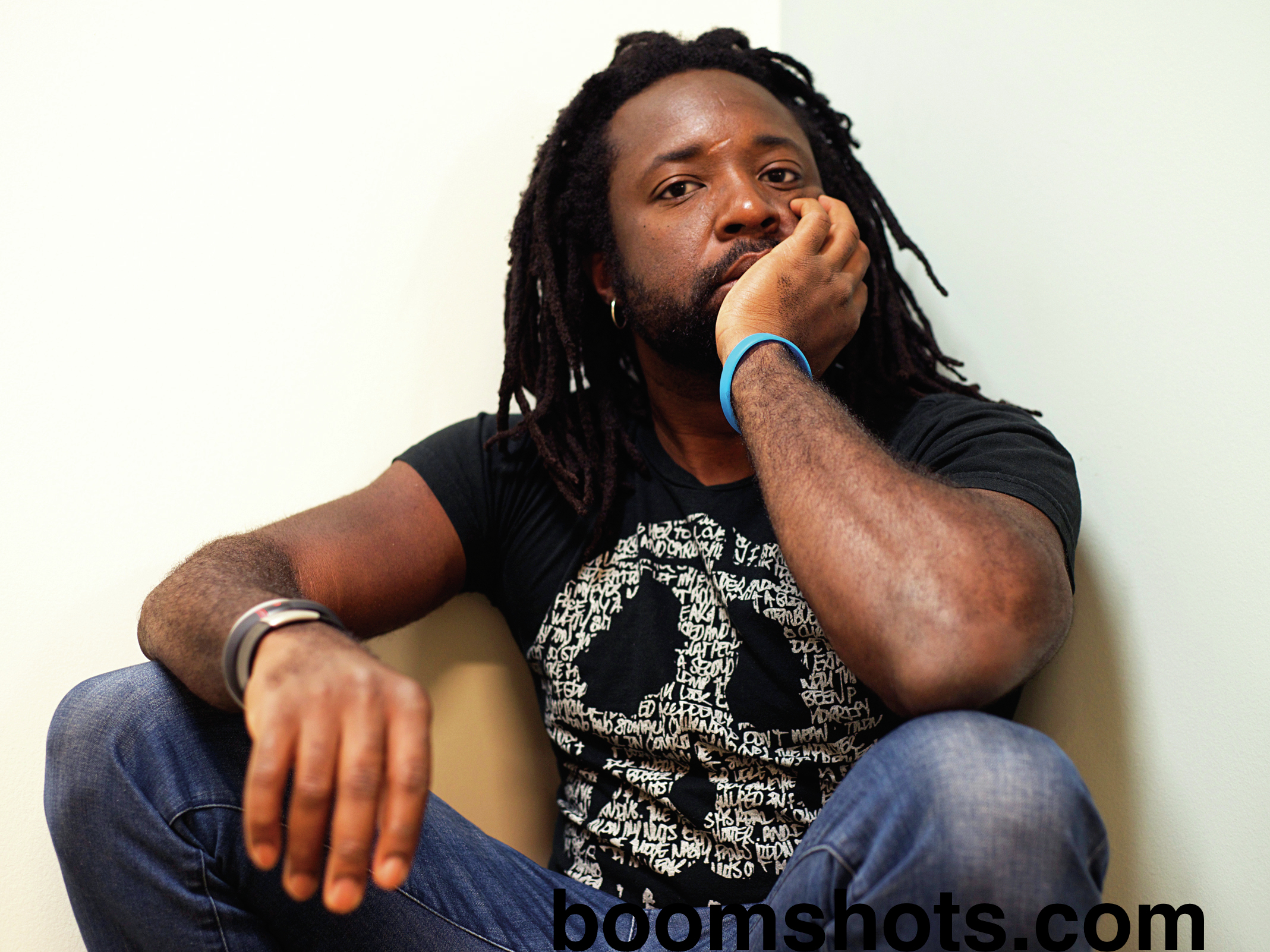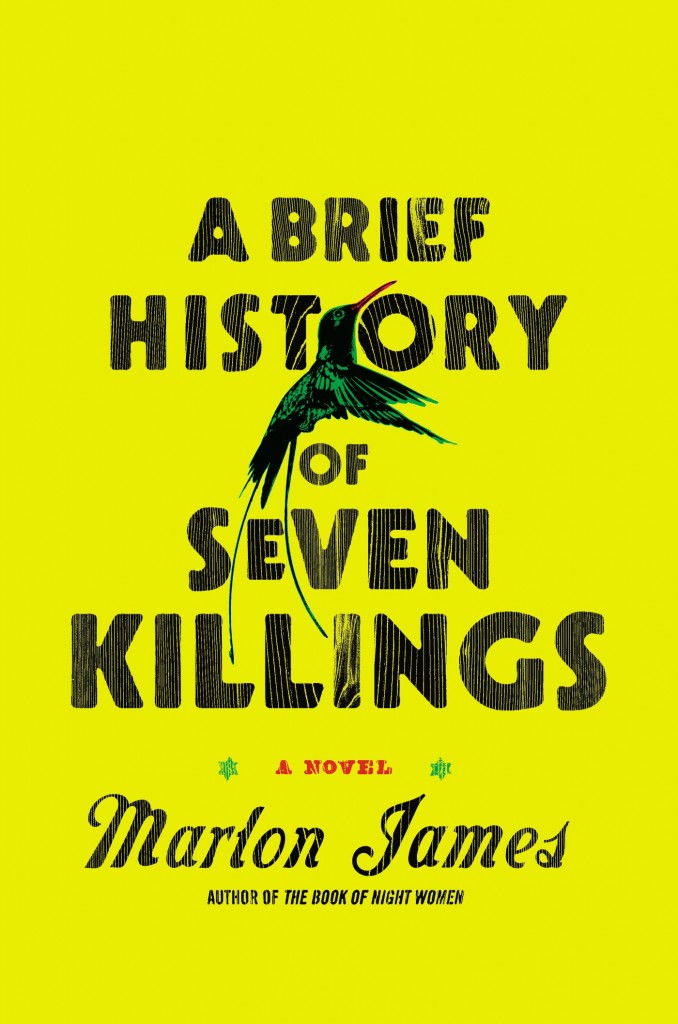
The Author of A Brief History of Seven Killings Has Had No Reaction from the Marley Family
Marlon James was born in Kingston, Jamaica, the son of two police officers. After earning a living designing album covers, he developed his interest in creative writing via the Calabash Literary Festival writer’s workshop. His debut novel, John Crow’s Devil, was published in 2010 by the Brooklyn-based indie press Akashic Books. His second, The Book of Night Women, about a slave rebellion on a 19th century plantation, won several awards, while the third, A Brief History of Seven Killings, published this October by Riverhead Books, has been hailed by the New York Times as “epic in every sense of that word: sweeping, mythic, over-the-top, colossal and dizzyingly complex.” Interview after the Jump…
Weighing in at some 700 pages, the sprawling, deliciously detailed, and anything-but-brief narrative centers around the 1976 assassination attempt on Bob Marley—who is identified in the book only as “the singer”—and maps all the sociocultural/geopolitical forces converging on and emanating from the island of Jamaica at that time, from the corrupt politicians to the coke dons to the ghetto sufferers to the CIA agents, tracing their ripples all the way through 1991 in the Bronx. (Some of these same forces are also, quite coincidentally, detailed in the latest Mass Appeal cover story.) Told in the voices of 12 utterly compelling characters (some of them loosely based on real people), the novel is nothing less than a masterpiece. On the evening of December 16, the 44-year-old novelist, who’s also a professor of literature and creative writing at Macalester College in St. Paul, Minnesota, will take the stage at the New York Public Library to converse with another celebrated man of letters, Salman Rushdie,. Tickets to that event are going for $25 a pop, but Marlon James was kind enough to speak with us free of charge.
The New York Times review of your book was obviously an amazing look and an unmitigated great thing. But how did you feel about the reviewer’s speculation that you may have gotten “a creative boost from some primo ganja”?
[Pause] Well, I mean, that’s neither here nor there. I certainly don’t smoke ganja.I was thinking that someone who could produce a 700-page manuscript probably wasn’t sitting around puffing weed.
[Laughs] Yeah, you know, I think it’s [Times book critic] Kakutani trying to be cute. I wasn’t really offended by it. You know, Jamaicans do pick the weirdest things to be sensitive about.I’m not trying to stir up beef. It just struck me as a little odd.
Yeah, it was kind of odd. It was trying in a very un-funny way to be funny. But it really didn’t bother me as much as it bothered some other people. [Laughs]
Oh, did you have people mad on your behalf about that?
Some people were like, “Why do they have to bring up the ganja thing just because he’s Jamaican?” I’m like, Dude, I don’t have that strong an opinion on it. I’m just glad I got a rave……
In another interview, you mentioned the phrase “The lie that tells the truth.” That got me to wondering if there was any trepidation in telling this story? Is this still a dangerous topic to be addressing? Are you somehow taking refuge in fiction from the repercussions of speaking on certain things?
Umm… There was. And there’s still a part of me that doesn’t think that necessarily fiction lets me off the hook. Part of the reason for writing fiction is that I just don’t think the nonfiction story is there. Most of the people who could talk are dead. The other people probably aren’t talking.
I also really wanted to resist the easy identification. A writer from the New York Times asked “Is this kind of a trickster thing?” And I was like, “Yeah,” but that’s also part of narrative, that’s also part of storytelling, especially African, African-derived and Jamaican storytelling where it’s the trickster that’s telling the story.
So that’s part of it. Yeah, there’s tons of people who are like, “Josey Wales—that must be Jim Brown.” Everything look like it’s Jim Brown, right down to the son dying. It’s like, yeah, but as far as I know Jim Brown can’t speak Spanish. Jim Brown isn’t secretly fluent in Spanish. And I don’t know, but I’m gonna guess that he was not so open-minded about gay people.
Yeah, that seems a fair assumption.
And Jim Brown does not look half-Chinese.
Right, right, right. But I heard that Laurie Gunst had to lie low after she published Born Fi Dead. You haven’t had any of those late-night phone calls?
God no, and I hope not. ‘Cause that would be really scary. I wasn’t trying to be brave and fearless about what I was writing, although I was writing with some sense of mission. A lot of what happened to these characters was a very Hollywood-style ending. A lot of them. ‘Cause I’m still interested in writing fiction and writing something kinda fantastical and writing something kind of like thriller or espionage or stuff like that. I have a feeling that people who are reading this looking for exact stuff will be disappointed.
I haven’t had any reaction from the Marley family. One, I can’t imagine why they would want to read it. And two, they’d probably be disappointed reading it cause their dad is gone one third of the way in. I have a feeling there’s somebody out there who may read it and be laughing at what I didn’t get right. You know, that’s it. I don’t know… I might stay away from Jamaica for a little bit. [Laughs]
Check out the full interview over at Mass Appeal
Subscribe to Boomshots TV
Follow @Boomshots




Jamaica may have to import American ganja, says US activist – Latest NewsKINGSTON, Jamaica — In the near future Jamaica could be importing cannabis (ganja) from the United States, says Ethan Nadelmann, founder and executive…JAMAICAOBSERVER.COM
Link: http://www.jamaicaobserver.com/latestnews/Jamaica-may-have-to-import-American-ganja–says-US-activist | Jamaican News Online – JamaicaObserver.com
Please support The Ganja Farmer. Don’t let the farmer be crushed by Big Business.
Here is one farmer’s story but it stands for all. They are responsible for the Ganja. So if you are enjoying bless the farmer.
http://youtu.be/Z49t_091Cvo
http://www.ganjabros.org
When you buy. Buy from a farmer not some giant industrial complex. Speak with your wallet. Demand the Farmer is raised High in the Global Green Rush. Support the real Jamaicans. Not something stolen and twisted to resemble Jamaican Ganja.
Farmers organize and find representation with those that respect and admire what you do. Do not give your art and talent for less than they are worth.
As the Green Rush heats up GREED becomes the way. Let’s remember how we got to the green rush and how. Years and Years of toiling farmers and Years and Years of Activism.
David Chun
Di Chemist
The Ganja Farmer Jamaica
Ganja Bros local farmer tells it as it is. The real deal. The Ganja Farmer Jamaica. The Ganja planter.
5 hours ago
The Ganja Farmer Jamaica
Ganja Bros local farmer tells it as it is. The real deal. The Ganja Farmer Jamaica. The Ganja planter.